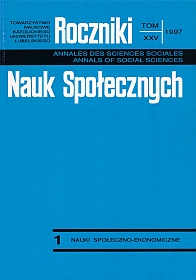In Search of the „true” Thomas. An Introductory outline of Studies on the Ethics of St Thomas Aquinas
Abstract
The treatise is an attempt at a synthetic characteristic of Thomas Aquinas’ ethics: its doctrinal and methodological assumptions, composite elements and its profile. At the grounds of that ethics we find the following philosophical-anthropological system: metaphysics of being, personalistic anthropology, conception of conscience and happiness, and the idea of finality. The idea of the ultimate goal and happiness plays an essential role here, therefore the ethical thought of the Aquinate should be included within the eudemonistic trend. There are many interpretations of Thomas’ ethics, and many of them are controversial. It is not an ethics of virtues, ethics of values or ethics of law and obligation. It is the ethics of moral good, natural law and cardinal virtues creating together an integrated moral system directed at man’s ultimate goal bound with the absolute and transcendent Good, that is God. The eudaimonism of St Thomas is essentially different from all those trends which explain man’s happiness in terms of immanent naturalism and hedonistic subjectivism. Thomas, however, takes into account those aspects of man’s life and his acts with a turn to the subject, but at the same time he links them, in a harmonious way, with the recognition of the objective moral order. Therefore he recognizes the objective criteria of moral good and evil, the objective rational and moral order, the need for happiness, and above all natural law based on the eternal Divine law. Thomas’ ethics has an absolute character, yet it is not a radical absolutism, for it differentiates in it the universal and stable elements from those which are variable, that is secondary. The former elements are grounded on the unchangeable human nature, the latter takes into account the historical and social conditions. The ethics of the „true” Thomas leaves the gate open for further ethical reflections.
Copyright (c) 1997 Roczniki Nauk Społecznych

This work is licensed under a Creative Commons Attribution-NonCommercial-NoDerivatives 4.0 International License.


